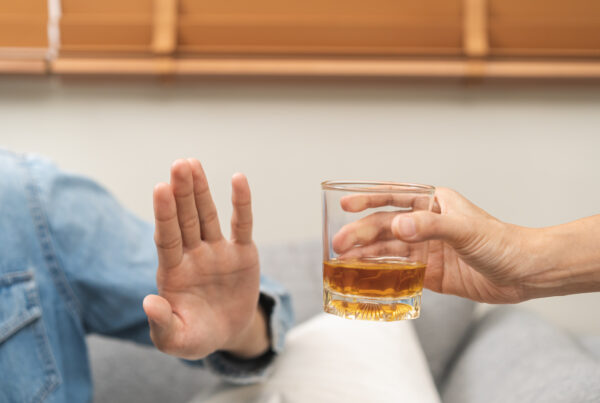Quick Summary:
PTSD and substance use often go hand in hand, with many people using drugs or alcohol to cope with trauma. When these conditions overlap, challenges intensify—impacting mental health, relationships, and recovery. This article explores why integrated treatment is essential, how it helps reduce stigma, and the importance of compassionate, trauma-focused care for healing and long-term recovery.
Clinically Reviewed by Nicholas Weisberger, LCSW

Nicholas Weisberger
LCSW
“When someone with PTSD turns to substances to self-medicate, they ultimately worsen their symptoms and increase the likelihood of addiction, which can then further trigger PTSD symptoms. That’s why it’s critical to treat both together.”
Post-traumatic stress disorder (PTSD) and substance use disorders (SUD) are often treated as completely separate issues. But these conditions actually overlap far more than many people realize — and understanding that connection is key to providing the right kind of care.
Research shows that nearly 60% of people living with PTSD also struggle with substance use1. And nearly 40% of people seeking help for substance use are also coping with PTSD2. That connection isn’t random; it happens because alcohol or drugs are often used as a way to numb, escape, or “self-medicate” the painful emotions and memories that come with trauma.

How PTSD Shows Up
PTSD can happen after experiencing or witnessing something deeply traumatic. As of 2020, PTSD affects about 13 million Americans every year, making it a more common condition that you’d think. Some risk factors include childhood trauma, lack of social support, family history of mental health struggles, or feeling helpless during traumatic events. Symptoms generally fall into four main categories:
- Re-experiencing – intrusive memories, flashbacks, or nightmares.
- Avoidance – steering clear of places, routines, or people that bring up painful reminders.
- Mood and cognition changes – negative self-talk, guilt, mistrust, and feeling isolated.
- Arousal and reactivity – extreme alertness, irritability, anxiety, or difficulty concentrating3.
PTSD + SUD= Bigger Challenges
When PTSD and substance use occur together, the challenges multiply. People often experience greater instability in their relationships, higher risk of depression or anxiety, and, unfortunately, a higher likelihood of suicidal thoughts or behaviors2.
The two conditions can also impact our brains in similar ways. On a biological level, both PTSD and addiction affect the brain’s stress and reward systems, particularly the amygdala, which controls our fight-or-flight response.
Sometimes, chronic substance use itself can increase the chances of experiencing trauma (and eventually PTSD) through impaired judgment, risky situations, or the emotional toll of using substances for long periods of time5.
Why Integrated Treatment Matters
More attention and therapeutic care need to be provided to help those dealing with both PTSD and substance-use disorders. By increasing awareness of the relationship between the two conditions, we can improve treatment outcomes, facilitate greater access to resources, and better help those struggling.
The good news is that effective, compassionate treatment exists. For example, trauma-focused therapies like eye movement desensitization and reprocessing (EMDR) can help ease PTSD symptoms4. When paired with addiction treatment, this kind of care can give people the tools they need to both process trauma and build long-term recovery from substance use.

Breaking Down Stigma
Maybe most importantly, understanding the link between PTSD and SUD disorders helps to remove stigma surrounding both. We all know that struggling with addiction is not a moral failure, and recovering from trauma isn’t as simple as “getting over it.” But many people who are suffering don’t seek out care, leading to shame or isolation. By raising awareness about how PTSD and substance use are connected, we can create more understanding, reduce judgment, and open doors to healing.
At MindGlow Health, we believe that individualized, integrated care is needed for effective treatment outcomes. If you or someone you love is facing these challenges, know that help is available, recovery is possible, and you deserve to feel better.
Sources:
-
“State of the science: treatment of comorbid posttraumatic stress disorder and substance use disorders” in state of the science journal 2024 DOI 10.1002/jts.23049
-
“Efficacy and acceptability of interventions for concurring PTSD and SUD: a meta-analysis in journal of anxiety disorders, volume 84, December 2021 https://doi.org/10.1016/j.janxdis.2021.102490
-
Post-traumatic stress disorder (PTSD) and Addiction: Signs, symptoms, and treatment” sponsored by American Addiction and medically reviewed by Kristen Fuller, MD
-
“Treating posttraumatic stress disorder and substance use disorder patients with co-occurring posttraumatic stress disorder: study protocols for a randomized control style to compare the effectiveness of different types and timings of treatment” in BMC psychiatry published September 7, 2021.
-
“Brain reward circuitry: the overlapping neurobiology of trauma and substance use disorders” in World Journal of Psychiatry 2021 Jun 19;11(6):222–231. doi: 10.5498/wjp.v11.i6.222






